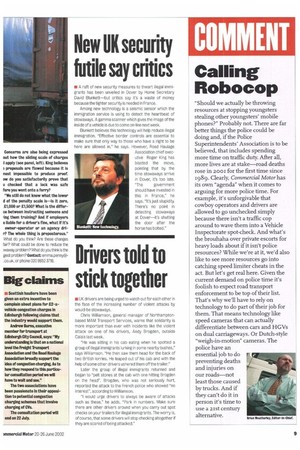Calling Robocop
Page 9

If you've noticed an error in this article please click here to report it so we can fix it.
"Should we actually be throwing resources at stopping youngsters stealing other youngsters' mobile phones?" Probably not. There are far better things the police could be doing and, if the Police Superintendents' Association is to be believed, that includes spending more time on traffic duty. After all, more lives are at stake—road deaths rose in 2001 for the first time since 1989. Clearly, Commercial Motor has its own "agenda" when it comes to arguing for more police time. For example, it's unforgivable that cowboy operators and drivers are allowed to go unchecked simply because there isn't a traffic cop around to wave them into a Vehide Inspectorate spot-cheek. And what's the brouhaha over private escorts for heavy loads about if it isn't police resources? While we're at it, we'd also like to see more resources go into catching speed limiter cheats in the act. But let's get real here. Given the current demand on police time it's foolish to expect road transport enforcement to be top of their list. That's why we'll have to rely on technology to do part of their job for them. That means technology like speed cameras that can actually differentiate between cars and HGVs on dual carriageways. Or Dutch-style "weigh-in-motion" cameras. The police have an essential job to do preventing deaths and injuries on our roads—not least those caused by trucks. And if they can't do it in
person it's time to use a 21st century alternative.
























































































































































